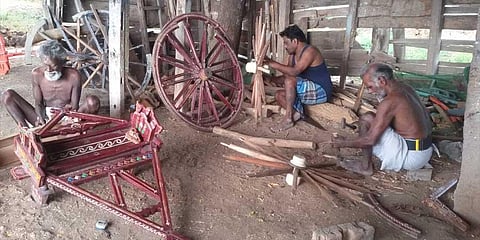

THOOTHUKUDI: For the third year in a row, rekla-race-cart craftsmen have to do the heavy-lifting themselves, for the bullock cart races, an integral part of the Pongal festival, were not given permission in view of the third wave of Covid-19.
Even as the rekla racers have set their eyes on the prize, with their vehicles and the racing bullocks ready, the lockdown restrictions have wiped the finish line out of sight. Only a handful of carpenters of three villages namely Mela Karanthai, Soorangudi and Nagalapuram in Thoothukudi district traditionally manufacture the rekla race carts.
The carpenters say they make two kinds of carts, one being a Achu Vandi whose wheels have wooden pulley and the other Bearing Vandi that has ball bearings.
The chief varieties of wood used for cart making are Konku, Vagai, teak and native Karuvelam trees. Mostly two-seater carts are made, which can haul over 100 kilogramme. The wooden pulley cart weighs heavier than that of the one made of ball bearings which are suitable for big bullocks.
R Kannan, a carpenter from Mela Karanthai said the ball bearing cart would weigh much less such that it can be lifted on a finger. "The bullocks would not get tired of using the ball-bearing carts whereas the one with wooden pulley needs more energy," he said. However, the riders choose the carts based on their experiences, he added.
The strenuous part of making the cart is its wheel part, the carpenters say. "A wooden wheel is made of six arc-shaped joints, fitting into the 12 wooden spokes pinning with the pulley. The arc-shaped part is made of native Karuvelam tree wood, while the spokes are made of vagai woods," says Kannan.
Kannan added he manufactures 15 to 18 carts in a year, and it is his only profession. While Achu Vandi costs Rs 30,000, the bearing vandi costs Rs 32,000. Both of these types have good demand in the market.
Another carpenter Samayaraj (29) of Nagalapuram said rekla racers from Kanyakumari, Tirunelveli, Tenkasi, and Ramanathapuram purchase carts from him. "I complete crafting one cart in a month. The Covid-19 pandemic has reduced the sales of rekla race carts to half. I inherited the art of manufacturing rekla carts from my father and forefathers. They predominantly made large bullock carts used for commercial purposes, however, such carts are not in use anymore," he said.
The business peaks from December to February every year as races are conducted from January till March. The rekla-race carts sales have dipped as races are not given permission due to the pandemic for the past two years, the carpenters say.
"Just like how the rekla race is traditional during the Pongal festival, the art of making the race cart is also a cultural identity of Tamils," said T Jansi Paulraj, the author of Madum Vandiyum. Though the number of carpenters making the carts for rekla race has declined drastically, a last set of craftsmen are still crafting the carts to sustain their livelihood, she added.